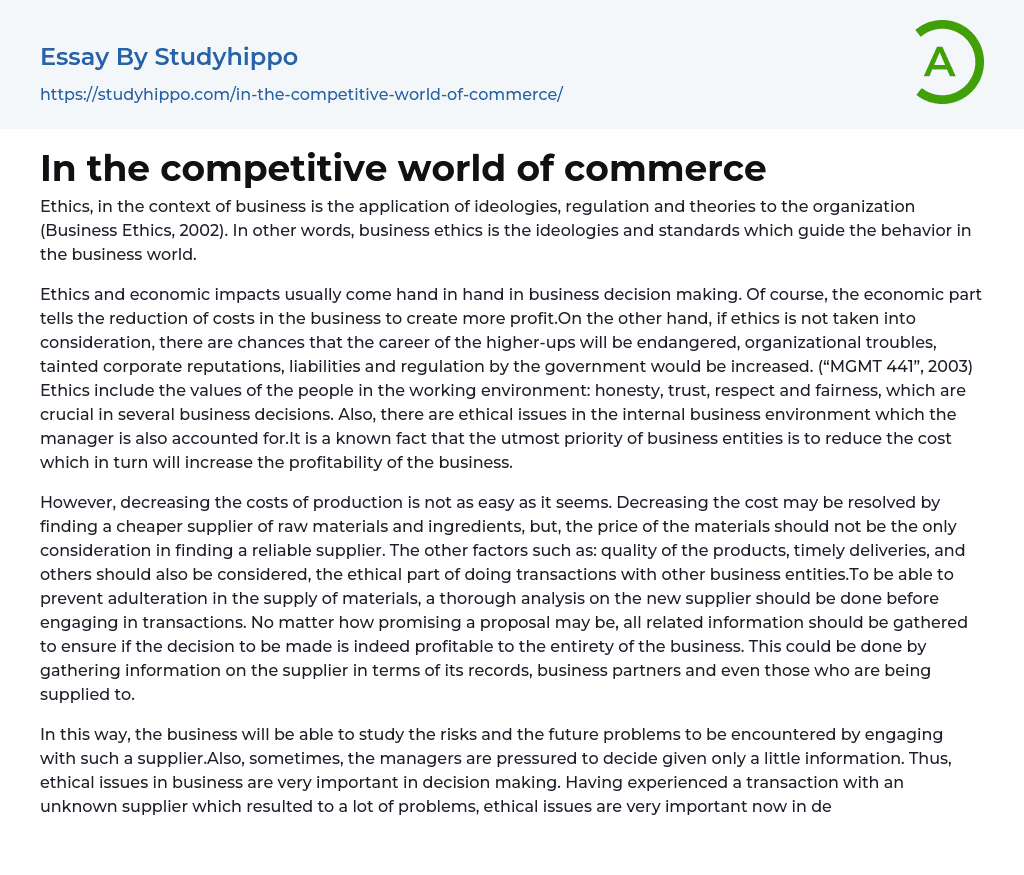Referring to the business world, ethics involves applying theories, ideologies, and regulations to the organization (Business Ethics, 2002). Essentially, business ethics is comprised of standards and ideologies that direct behavior in the business realm.
When making business decisions, it is important to balance both economic impacts and ethics. While the goal of increasing profits through cost reduction is important, neglecting ethical considerations can lead to negative consequences such as damaging the reputations of higher-ups, causing organizational issues, increasing liability, and attracting government regulation (MGMT 441, 2003). Business ethics should include core values like honesty, trustworthiness, respectfulness and fairness that are imperative for many corporate decisions. Additionally, managers have a responsibility to address ethical matters within their organizations. It should be noted that businesses prioritize cost reduction in order to enhance profitability.
To lower production expenses can be a diff
...icult undertaking, which may require sourcing less expensive raw materials and ingredients. Nevertheless, it is crucial to take into account additional elements including quality, punctual delivery, and ethical business practices when choosing a dependable supplier. A comprehensive assessment of potential suppliers is imperative in order to avoid the contamination of materials. It is necessary to accumulate all pertinent information and evaluate the profitability of transactions for the entire company. This could involve scrutinizing supplier records as well as their associations with other firms and clientele.
Businesses must consider ethical factors when choosing a supplier to identify potential risks and issues. Managers may face negative consequences due to a lack of information, making ethical considerations crucial in selecting the appropriate supplier after encountering problems with an unfamiliar one. Business Ethics (2002) provides various approaches for ethical decision-making, including Teleological, Egoism, Utilitarianism
Deontological, Justice and Relativism. The Teleological approach assesses the success of decisions based on their outcomes.
Egoism emphasizes only self-interest when making decisions, whereas Utilitarianism considers all factors involved in the decision-making process.
When assessing the ethics of a decision, it is crucial to weigh its costs and benefits. Determining the morality of a decision involves considering whether its advantages outweigh its drawbacks and benefit most parties involved. Deontology prioritizes equal treatment for all individuals by taking into account various perspectives and the jurisdiction of the decision-maker, rather than solely focusing on the majority like utilitarianism does. When making decisions, justice emphasizes adhering to legal regulations.
The Relativism approach holds that the judgment on whether a decision is right or wrong is constantly shifting and varies across cultures. In contrast, Utilitarianism is the preferred approach in business as it weighs the advantages and disadvantages of a decision. (Boatright, J. R.)
The webpage "MGMT 441" from 2003 can be accessed at http://homepages.luc.edu/~jboatri/docs/SYLL441, as of May 23, 2007.
pdf>. The authors of this document are Ferrell, O. C., Fraedrich, J., and Ferrell, L.
Business Ethics by Houghton Mifflin Company in 2002.
- Values of Life essays
- Ethical dilemma essays
- Normative Ethics essays
- Virtue Ethics essays
- Belief essays
- Deontology essays
- Moral essays
- Virtue essays
- Work Ethic essays
- Board Of Directors essays
- Brand Management essays
- Business Ethics essays
- Business Management essays
- Change Management essays
- Comparative Analysis essays
- Decision Making essays
- Dispute Resolution essays
- Knowledge Management essays
- Leadership essays
- Leadership and Management essays
- Manager essays
- Operations Management essays
- Performance Management essays
- Product Management essays
- Project Management essays
- Quality Management essays
- Risk essays
- Risk Management essays
- Scientific Management essays
- Stress Management essays
- supply chain management essays
- Time Management essays
- Total Quality Management essays
- Automotive essays
- Automotive Industry essays
- Commerce essays
- Construction essays
- E Commerce essays
- Grocery stores essays
- Paper Industry essays
- Pharmaceutical industry essays
- Pharmacy essays
- Polymers essays
- Real Estate essays
- Textile Industry essays
- Acceptance essays
- Age Of Enlightenment essays
- Child Observation essays
- Confucianism essays
- Conscience essays




